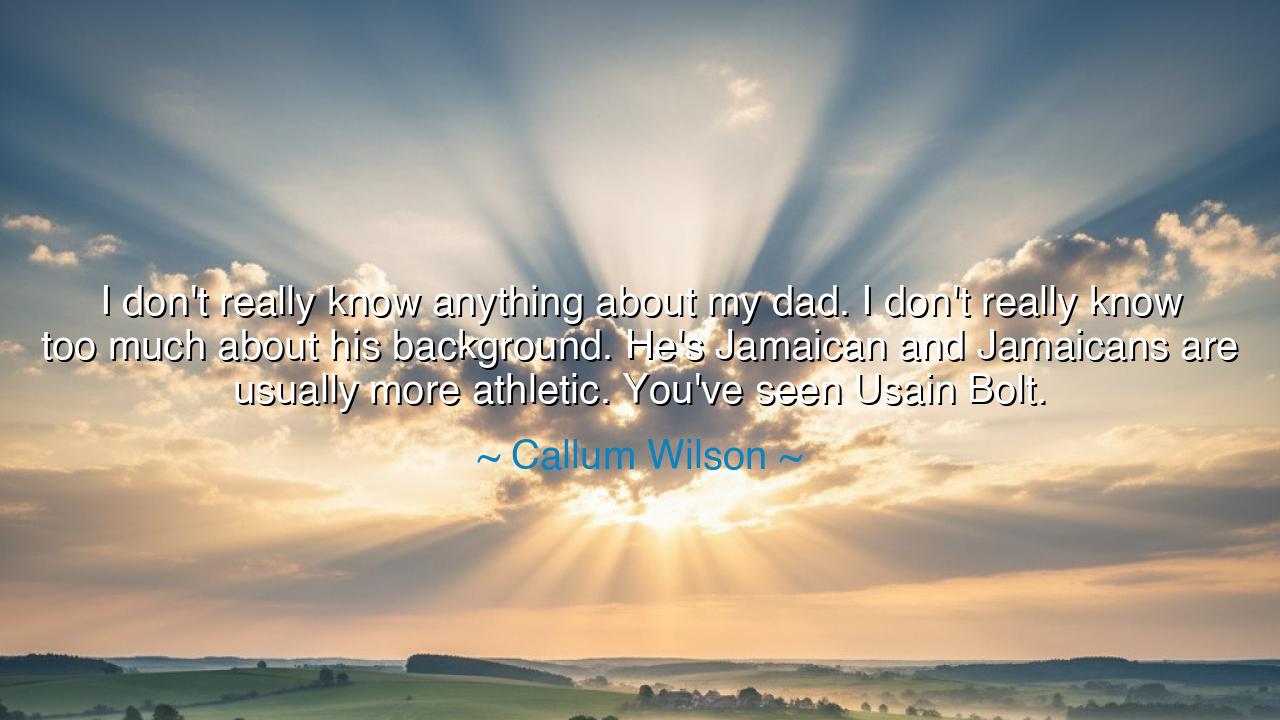
I don't really know anything about my dad. I don't really know
I don't really know anything about my dad. I don't really know too much about his background. He's Jamaican and Jamaicans are usually more athletic. You've seen Usain Bolt.






“I don’t really know anything about my dad. I don’t really know too much about his background. He’s Jamaican, and Jamaicans are usually more athletic. You’ve seen Usain Bolt.” Thus spoke Callum Wilson, the English footballer whose words carry both pride and absence — a quiet confession wrapped in resilience. Beneath the simplicity of his tone lies a profound reflection on identity, heritage, and the longing for connection. His statement is not just about the father he never knew; it is about every child who grows into strength despite the silence of their roots.
To say “I don’t really know anything about my dad” is to acknowledge a wound that never truly closes. It is the ache of distance — not only physical, but spiritual. In every human being there is a yearning to know where they come from, for ancestry is the soil in which our sense of self grows. Yet Wilson, like many before him, finds meaning not in what was given, but in what he has chosen to become. His words carry no bitterness, only quiet acceptance — a recognition that though heritage shapes us, it does not imprison us.
The mention of his father’s Jamaican bloodline and of Usain Bolt is not mere comparison — it is a bridge. In honoring his father’s origin, Wilson honors a land whose spirit is indomitable, whose sons and daughters have carried greatness on their shoulders. Jamaica, though small in size, has produced giants — runners, musicians, dreamers — each born from struggle, yet radiant with pride. In invoking Bolt, the fastest man alive, Wilson recognizes the fire of that lineage within himself — an inheritance of strength, rhythm, and endurance. Even without knowing his father, he knows the pulse of the island runs in his veins.
Such stories echo through the ages. Many heroes of old were born without the guidance of their fathers — yet from that emptiness, they drew their own light. Telemachus, the son of Odysseus, grew in the shadow of an absent hero, not knowing if his father lived or died. But the young man’s journey was not merely to find his father; it was to find himself, to understand that his courage did not depend on the man who sired him, but on the man he chose to become. So too, Wilson’s story becomes one of transformation: from uncertainty to self-made strength, from missing roots to living testament.
And yet, Wilson’s reflection is not only about absence, but about inheritance beyond knowledge. For though he may not know his father’s story, he still carries his essence — the instinct of movement, the rhythm of power, the athletic spark that ignites his body into motion. This is the paradox of blood: we inherit not just faces and forms, but tendencies, gifts, and echoes of unseen ancestors. Even when the story is lost, the song continues — carried in muscle, in heartbeat, in breath. The ancients believed that one’s ancestors live within, whispering their wisdom through instinct and dream. Wilson’s words remind us that we can still belong to what we do not fully know.
Yet there is something noble in his humility. He does not glorify himself; he gives thanks to his unseen lineage. He understands that greatness, whether in himself or in Usain Bolt, is not a solitary flame but a spark from a long and hidden fire. This is the humility of the true athlete — to recognize that strength is a gift of generations, and that even without a father’s guidance, one can still honor the father’s origin. Wilson’s acknowledgment becomes an act of healing — a bridge between the known and the unknown, between personal story and collective spirit.
So, my child, learn from these words: your worth is not diminished by the mysteries of your past. Whether you know your father or not, whether your heritage is clear or clouded, the power within you remains sacred. Seek to understand where you come from, but never let the limits of your knowledge define you. Let your life become the continuation of the story your ancestors began. Work hard, honor your roots, and let your actions speak where silence once was. For as Callum Wilson reminds us, even without the full tale of our fathers, we can still rise — swift, steadfast, and shining — like the sons and daughters of the wind, bearing the greatness of those who came before us, known or unknown.






AAdministratorAdministrator
Welcome, honored guests. Please leave a comment, we will respond soon